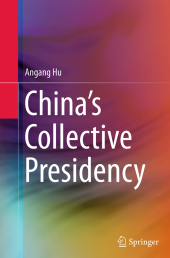 Neuerscheinungen 2016Stand: 2020-02-01 |
Schnellsuche
ISBN/Stichwort/Autor
|
Herderstraße 10
10625 Berlin
Tel.: 030 315 714 16
Fax 030 315 714 14
info@buchspektrum.de |

Angang Hu
China´s Collective Presidency
Softcover reprint of the original 1st ed. 2014. 2016. vi, 157 S. 235 mm
Verlag/Jahr: SPRINGER, BERLIN; SPRINGER BERLIN HEIDELBERG 2016
ISBN: 3-662-51536-9 (3662515369)
Neue ISBN: 978-3-662-51536-5 (9783662515365)
Preis und Lieferzeit: Bitte klicken
This book examines the historical development of China´s collective presidency and identifies five key mechanisms which effectively reduce the asymmetries of knowledge and power. The mechanisms discussed are: group or collective succession, collective division of responsibilities and cooperation, collective learning, collective research and collective decision making. This work presents many facts including historical details showing that the collective presidency of China is a unique and prodigious innovation of the Communist Party of China (CPC) and China´s socialist political system. We see how China´s political system stands in contrast to the presidential system that exists in the United States, which can be described as a system of personal responsibility of the president. The author identifies characteristics of the collective presidency and introduces a framework for analysis. Chapters then explore the phases of historical development in detail and examine fundamental features in terms of their historical development, operational characteristics and evaluation. The final chapter summarizes the political advantages of collective presidency, particularly international competitive advantages and readers will discover that the route to success for modern China lies in collective presidency. This book will appeal to anyone who wishes to discover how China´s political system works, to explore its political institutions that operate in conjunction with the CPC and the Chinese state or to discover how a collective presidency can work successfully.
Introduction - Key to the Success of China´s Political System.- The Historical Development of the Collective Presidency in China.- Collective Division of Work and Cooperation.- The Collective Handover Procedure.- Collective Learning.- Collective Research.- Collective Decision Making.- Political Advantages of the Collective Presidency.- Postscript.


